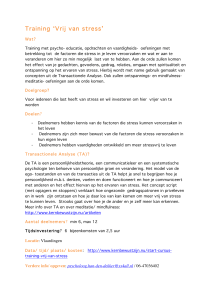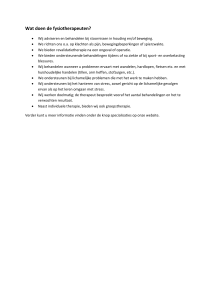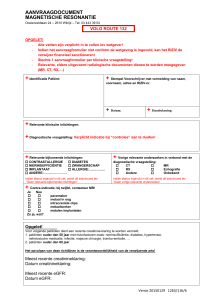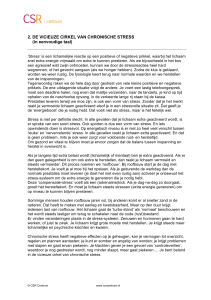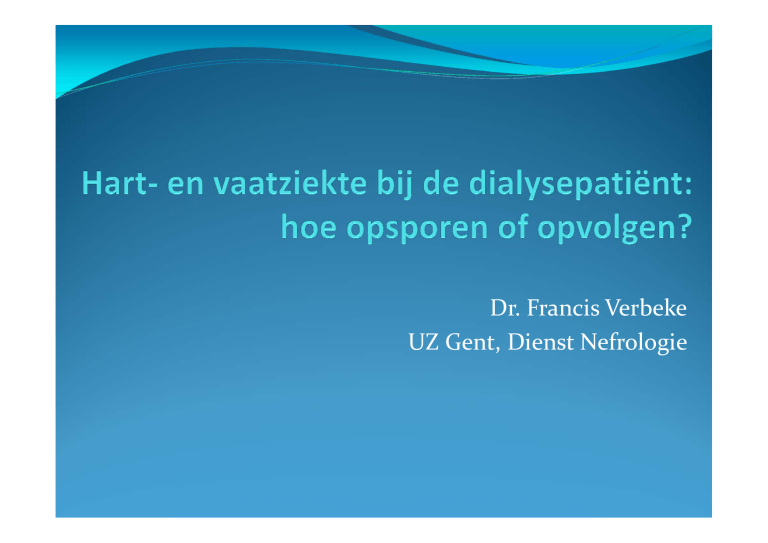
Dr. Francis Verbeke
UZ Gent, Dienst Nefrologie
Hart‐ en vaatstelsel
Hart (Linker ventrikel – LV)
Pomp (myocard)
Doorbloeding (coronairen)
Aorta en grote arteriën
Cerebrovasculaire circulatie
Aorta en grote zijtakken
Perifere circulatie (OL)
Ventriculo‐vasculaire koppeling
Atheromatose
Arteriosclerose
Linker ventrikel
hypertrofie
pompfalen
klepafwijkingen
+ Calcificaties
Hart‐ en vaatstelsel Aandoeningen
Hart (Linker ventrikel – LV)
Pomp (myocard)
Doorbloeding (coronairen)
Aorta en grote arteriën
Cerebrovasculaire circulatie
Aorta en grote zijtakken
chron. hartfalen, hypertrofie
ischemie => longoedeem, ritmestoornissen
Perifere circulatie (OL)
CVA, TIA
AO aneurysma, angor
abdominalis, …
claudicatio, wondes, amputatie
Ventrikel‐vaatkoppeling
LV hypertrofie, hoge RRS, UF, …
Onderzoeksmethodes
Doel? Prognostisch of diagnostisch
Diagnostisch (individuele patiënt, specifieke entiteit/dx)
‐ Diagnostische waarde: sensitiviteit en specificiteit
‐ Kosten en risico’s
Prognostisch (probabiliteit ~ groepsniveau, specifieke outcome)
Welke?
Biomerkers (serum)
Niet‐invasieve beeldvorming ‐ ECG
Invasief: angiografie
Wie?
Symptomatische patiënten
Asymptomatische patiënten (screening)
Anatomie & fysiologie
Symptomen & gevolgen
Diagnostische testen
Hart en coronairen
Coronaire ischemie
Coronaire reserve: coronaire perfusie kan 4‐6x toenemen = coronaire reserve (VD + recrutering capillairen)
P↓ ~ [A0/As – 1]2
<40% stenose: geen daling 50%: matige daling
75%: significante stenose
>85%: uitgeput (kritische stenose)
(1/0.6‐1)2 = 0.4
(1/0.5‐1)2 = 1
(1/0.25‐1)2 = 9
(1/0.15‐1)2 = 32
Klinisch: adaptatie (remodeling), 1‐meerdere vernauwingen, wisselende lengte, complexiteit en ernst, collateraalvorming => slechte correlatie angiografische
ernst van stenose en coronaire reserve
Coronaire ischemie: SS & gevolgen
Symptomen
Ohtake 2005: 30 asymptomatische incidente HD‐
patiënten: significante letsels bij 53% (bij diabetici: 83%!)
Dialyse patiënten met DM en angiografisch gedocumenteerd coronair lijden: 75% asymptomatisch
Gevolgen
Pompfunctie ↓ => longoedeem, cardiogene shock
Ritmestoornissen (ventriculaire !)
Coronaire ischemie: symptomen
Coronaire ischemie bij dialyse
Zuurstoftoevoer ↓
Anemie
Hypotensie (UF)
Zuurstofbehoefte ↑
Hyperdynamische circulatie door AV‐shunt
Overvulling: steefgewicht? (vermagering)
Coronaire reserve ↓
Verstoorde VD => angor mogelijk zonder significante stenosen; microvasculaire angor (niet‐revasculariseerbaar)
Complicaties
↑ gevoeligheid voor aritmie door electrolytenshifts
(cave laag K‐bad bij digitalis (Lanoxin))
Cave klassieke anti‐angineuze VD therapie (NO‐donoren zoals Cedocard, Corvaton, Coruno) <‐> UF problemen
Coronaire ischemie: diagnose
Serologische merkers
Troponine, …
Functionele testen & ECG +/‐ Beeldvorming
Rust ECG (vergelijkingspunt)
(Rust)echocardiografie
Inspanningsproef
Inspanningsproef met
Fysieke inspanning
Farmacologische stress‐test
Echocardiografie
Isotopen scintigrafie
Anatomisch onderzoek
Hartcatheterisatie (coronarografie) ± stenting
EBCT, MRI
Inspanningsproef: principe
Stenose‐graad
Coronaire reserve
Collateralen
Timing: midweek, post‐dialyse (?)
Voor dialyse : overvulling
Na dialyse : vermoeidheid/hypotensie/tachycardie
Inspanningsproeven
Klassieke cycloërgometrie:
Voldoende fysieke inspanning: aandacht voor
Orthopedische belemmeringen
Perifeer vaatlijden
Cardiopulmonale belemmeringen (COPD, hartfalen, …)
Interpreteerbaar ECG (LBBB, Pacemaker, …)
Bradycardiserende medicatie (Beta‐blokker) te stoppen (atenolol, metoprolol, bisoprolol, …)
Farmacologische stress testen (liefst + EF):
Dipyridamole (Persantine): vasodilatatoire stress
Dobutamine (Dobutrex): inotrope (+chronotrope) stress
Klassieke cycloergometrie
Dobutamine stress: // fysieke inspanning
(tachycardie, RR‐
stijging, inotropie)
Farmacologische stress‐testen
Dipyridamole stress: principe
Stress testen met scintigrafie
SPECT: Single Photon Emission Computed Tomography
4 uur nuchter
Dipyridamole: geen caffeïne houdende dranken
Dobutamine: stop BB
Dipyridamole (Persantine®)
SPECT
Rust
Dobutamine (Dobutex®)
Echo
Stress
Reversiebel
Gefixeerd
Farmacologische stress‐testen: CI
Onstabiele angor, ritmestoornissen
Persantine:
Ernstig astma/COPD (Doseer‐aerosols? Cortisone?)
Theofylline: Xanthium®, Theolair®
Predialyse RRs <90 mmHg
Dobutamine:
Ernstige aorta stenose
Hypertrofische obstructieve cardiomyopathie
Aorta dissectie en aorta aneurysma
ADPKD?
Atriale tachyarritmie met ongecontroleerd ventriculair antwoord
Predialyse RR >200/100 mmHg
Farmacologische stress‐testen
Voordelen:
Niet beperkt door mogelijkheid tot fysieke inspanning
In combinatie met echo/scintigrafie: onderscheid tussen oud letsel en actieve ischemie
Complementaire info voor angiografie
Nadelen:
Dobu & persantine (subjectieve tolerantie vergelijkbaar)
Diagnostische waarde (vals + en vals ‐)
SPECT: vals neg bij gebalanceerd multivessel disease
Dobu: meer vals +
A. De Vriese, et al. Kidney International 2009; 76: 428–436
Hartcatheterisatie
Coronary dilatation
Hartcatheterisatie (angiografie)
Indicatie: navragen UF bij onstabiele angor of vermoeden actieve ischemie
Arteriële punctie: rekening houden met antico
Contrast <‐> restnierfunctie (PD, pre‐dialyse):
Geen radiocontrast prehydratatie
CVVH? Post‐contrast dialyse?
Stenting: rekening houden met anti‐aggregantia (aspirine, Plavix), antico (heparine)
Dialyse antico navragen
Nabloeden fistelpunctie
Angiografie: complicaties
Contrast
RX‐straling
Nabloeden
Pseudo‐aneurysma vorming
Cholesterolembolen
Iatrogeen pseudo‐aneurysma
Cholesterolembolisatie
Labo:
‐ Eosinofilie
‐ LDH
‐ Inflammatie (CRP, Sed)
…
Cholesterolembolisatie
Coronarografie bij dialyse pten:
Wanneer?
Symptomen (RS pijn; onverklaard hartfalen (intolerantie UF))
Wijziging rust ECG
Reversiebele ischemie bij inspanningstest
Pre‐TX screening:
Diabeten
ATCD van coronair lijden of CV‐event
Nieuwere technieken
CT (EBCT) hart, aorta, …
MRI
PET‐CT
Tissue‐doppler
Contrast echografie
Coronaire EBCT
Aortic root calcification in 69 y asymptomatic man on EBCT. AO root Ca may extend into ostia of left main and right coronary arteries (arrowheads). Inclusion of AO root Ca in total coronary Ca‐core will result in falsely ↑ value. AAo = ascending aorta, PT = pulmonary trunk, LA = left atrium, RAA = right atrial appendage, LAA = left atrial appendage, RSPV = right superior pulmonary vein, LSPV = left superior pulmonary vein, SVC = superior vena cava.
Echo‐hart
Echo‐carotiden
Quantificatie vaatwand calcificaties
Arteriële stijfheid: pulse wave velocity
=> impact of ventriculo‐vasculaire koppeling
Abdominal Aortic Calcification
4 segments (1st – 4th lumbar)
Separate grading for anterior and posterior wall
0: no calcific deposits
1: small scattered calcific deposits filling less than 1/3 of the longitudinal wall of the aorta 2: 1/3 – 2/3 of the wall calcified
3: 2/3 or more of the wall calcified
Level Posterior Anterior
A+P
L1
1
0
1
L2
2
1
3
L3
3
2
5
L4
3
3
6
Total
15 (24)
Central hemodynamics: stroke volume and arterial wall properties
Conduit and Cushioning
Function
Mean
pressure
Systole Diastole
Blood pressure
Blood pressure
Pure Conduit Function
Mean
pressure
Systole
Diastole
Cushioning function: pulse wave velocity
Carotid A
∆x
∆x
∆t
∆t
Femoral A
= Pulse Wave Velocity
PWV
Arteriële stijfheid + Aorta‐calcificatie
F. Verbeke, et al. Clin J Am Soc Nephrol 2011; 6: 153–159
Merkers van subklinische vaatbeschadiging
Voordelen:
Niet‐invasief
Relatief goedkoop, (potentieel) wijd beschikbaar
Prognostische informatie
Niet beperkt tot een specifiek vaatbed
Nadelen:
Echo: operator dependent, moment tov. Dialyse (volume dependent)
Kwalitatief of semikwantitatief (klepcalcificaties; abd
RX AAC‐scoring)
Therapeutische implicaties onduidelijk
Coronaropathie symptomen
Functionele (stress) testen & angiografie
Evaluatie van calcificatie en vaatstijfte
Conclusies (1)
Typische of atypische thoracale (pijn) symptomen steeds te melden
Typische symptomen van coronaire ischemie niet altijd aanwezig (hypotensie, algemeen onwel, maaglast, …)
Typische symptomen niet steeds = coronaire ischemie:
Anemie
Hypotensie (diastolische bloeddruk!)
Andere aandoeningen (embolie, AO‐aneurysma, …)
Tx‐kandidaten: extra aandacht, zeker wanneer DM en/of gekend hart‐vaatlijden
Routine ECG: nuttig vergelijkingspunt (soms silentieus AMI), of op moment van klachten
R/ Geen nitraten aan dialyse; navragen UF ‐ dialyseduur
Conclusies (2)
Stress‐testen (fysiek of farmacologisch) = functionele OZ => complementaire info t.o.v. Catheterisatie
Navragen:
Welke medicatie evt. te stoppen
Rust ECG laten nakijken: VKF? LBBB?
Astma, ongecontroleerde BP, ADPKD?
Wanneer: pre‐post dialyse?
Welke belasting: fysieke mogelijkheden van patiënt
Ook bepaling EF? (2 daags protocol)
Conclusies (3)
Coronarografie = invasieve procedure: cave
Pseudo‐aneurysma
Cholesterolembolen (laattijdig)
Plavix?
Quantificatie van vaatcalcificatie en arteriële stijfheid (PWV): sterke predictors voor outcome maar therapeutische implcaties momenteel nog onduidelijk
Vaatlijden kan snel evolueren en geen enkele test is sluitend: bij nieuwe of blijvende klachten steeds arts verwittigen (ook indien vroeger onderzoek negatief was)




